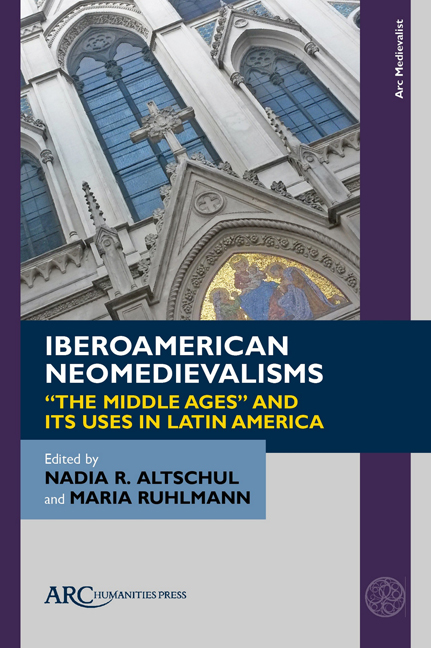Book contents
- Frontmatter
- Contents
- List of Illustrations
- Chapter 1 Postcolonizing Neomedievalism:An Introduction
- Chapter 2 The Criollo Invention of the Middle Ages
- Chapter 3 A Militant and Peasant-Based Medieval History in Brazil: Fanning the Spark of Hope
- Chapter 4 Neomedievalism and the Hagiography of Valdemiro Santiago: Neopentecostal Sanctification
- Chapter 5 The “Middle Ages” in the Brazilian Presidential Elections of 2018: The Left, the Right, and the Centre
- Chapter 6 Averroes in Mid-Colonial and Inter-Imperial Cordoba
- Chapter 7 Hypermedievalizing and De-Medievalizing Dante: Leopoldo Lugones’s and Jorge Luis Borges’s Rewritings of Inferno V
- Chapter 8 Borges and Kennings
- Chapter 9 Memory, Desire, and Sexual Identity in Manuel Mujica Lainez’s El unicornio
- Chapter 10 Rewriting and Visualizing the Cid: The Reconstruction of Medieval Gender and Race in Argentinian Graphic Novels
Chapter 10 - Rewriting and Visualizing the Cid: The Reconstruction of Medieval Gender and Race in Argentinian Graphic Novels
Published online by Cambridge University Press: 18 November 2023
- Frontmatter
- Contents
- List of Illustrations
- Chapter 1 Postcolonizing Neomedievalism:An Introduction
- Chapter 2 The Criollo Invention of the Middle Ages
- Chapter 3 A Militant and Peasant-Based Medieval History in Brazil: Fanning the Spark of Hope
- Chapter 4 Neomedievalism and the Hagiography of Valdemiro Santiago: Neopentecostal Sanctification
- Chapter 5 The “Middle Ages” in the Brazilian Presidential Elections of 2018: The Left, the Right, and the Centre
- Chapter 6 Averroes in Mid-Colonial and Inter-Imperial Cordoba
- Chapter 7 Hypermedievalizing and De-Medievalizing Dante: Leopoldo Lugones’s and Jorge Luis Borges’s Rewritings of Inferno V
- Chapter 8 Borges and Kennings
- Chapter 9 Memory, Desire, and Sexual Identity in Manuel Mujica Lainez’s El unicornio
- Chapter 10 Rewriting and Visualizing the Cid: The Reconstruction of Medieval Gender and Race in Argentinian Graphic Novels
Summary
This essay compares the modern rewriting and visualizing of the medieval Castilian epic Poema de mio Cid (PMC) in two as-yet unstudied Argentinian graphic novels: Cantar de mio Cid (2012) (CMC) written by Manuel Morini and illustrated by Ivan Jacob, and Mio Cid (2018) (MC) written by Alejandro Farias, illustrated by Antonio Acevedo and coloured by Nicolás Ávila. Both are creative manifestations of neomedievalism; a lens that is yet to be applied to Latin American comics. Here I understand neomedievalism in the same way in which Haydock previously defined medievalism, as “a discourse of contingent representations derived from the historical Middle Ages, composed of marked alterities to and continuities with the present.” Though scholars have attempted to distinguish medievalism from neomedievalism based upon to what extent a modern recreation of the medieval is “fictionalized” or “fantastical,” such as Richard Utz and KellyAnn Fitzpatrick, this distinction is ultimately untenable and imprecise, particularly when dealing with creative forms alien to the Middle Ages including cinema and graphic novels. An element of visual creativity or fantasy is unavoidable in graphic novels, though the story might explicitly rewrite medieval precedent. Nadia Altschul has also made a cogent case for neomedievalism over medievalism in this volume, given its Anglocentric origins and confusing conflation with medieval studies. I thus consider these graphic novels neomedievalist recreations, though I nevertheless write as a medievalist familiar with the earliest extant version of the story found in PMC. This article will therefore explore how this earlier text has been transformed as well as how its resultant recreations in the graphic novel form react to their modern Argentinian context of reception. This approach is informed by Gérard Genette's framework of intertextual relationships: the earliest extant version of the PMC (ca. 1207) is explicitly denoted in both cases as the hypotext upon which the graphic novels are grafted, as hypertextual reworkings that have the capacity for transformation as well as imitation.
The two graphic novels sit at the fascinating intersection of two sociocultural situations: as postcolonial afterlives of a colonizer's literary history on the one hand, and ideologically transformed neomedievalisms on the other. They remember and recast a literary history that is not quite Argentina’s, but a history indelibly connected to the formation of the modern nation state.
- Type
- Chapter
- Information
- Iberoamerican NeomedievalismsThe Middle Ages' and Its Uses in Latin America, pp. 173 - 201Publisher: Amsterdam University PressPrint publication year: 2023



